Before you can start hauling loads across the country, you have to pass a compulsory medical evaluation administered by the Department of Transportation — this evaluation is called the DOT medical exam.
As part of the test, a certified physician has to evaluate your mental, physical, and emotional capacity to handle the rigors of truck driving. And in order to succeed, you’ll need to present a clean bill of health from a certified medical practitioner.
But getting your DOT physical card often comes with challenges, especially when you have pre-existing medical conditions. In this article, we’ll explore the importance of the DOT physical exam as well as explore how to navigate this process for a truck driver jobs.
Contents:
- What Is a DOT Physical?
- What Does a DOT Physical Consist Of?
- What Are the DOT Physical Requirements?
- Where Do You Go to Get a DOT Physical?
- What Do You Need to Bring to a DOT Physical?
- What Can Disqualify You From a DOT Physical?
- How to Prepare for a Physical Exam?
- How Much Does the DOT Physical Cost?
- What Happens if You Fail the DOT Physical?
- Conclusion
What Is a DOT Physical?
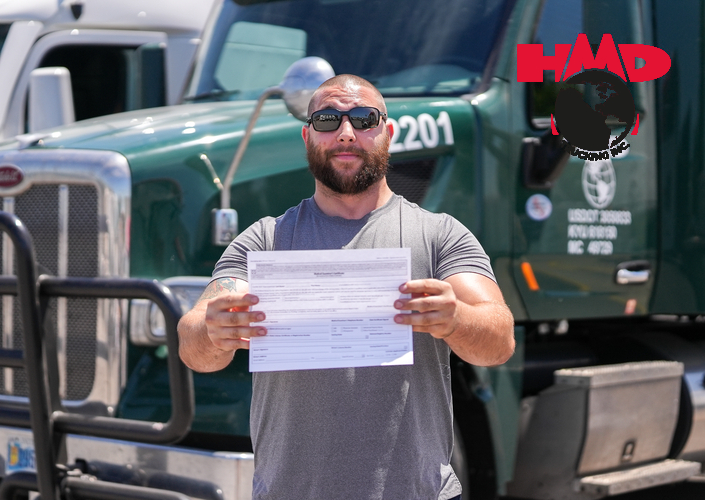
A DOT physical is a medical examination that every truck driver must complete before they can be deemed fit to drive. This physical test is a necessity, judging by the fact that over 80% of truck drivers suffer from at least one chronic disease.
Although the Department of Transportation administers this test, the Federal Motor Carrier Safety Administration (FMCSA) has made it one of the requirements when applying for a trucking license.
Who Needs to Do a DOT Physical?
You must complete a DOT physical exam if you fall within any of these groups:
- People who transport hazardous materials (hazmat drivers).
- People who operate vehicles with over 8 people.
- People who transport vehicles that weigh over 10,000 lbs combined.
- Interstate drivers who transport more than 15 people.
In general, you need a DOT physical if you want to obtain a commercial driver’s license.
Furthermore, you’ll have to take the test every 2 years to keep your license valid. In rare cases when you have conditions that require constant monitoring (for example, diabetes), you may be required to take the physical exam more frequently.
What Does a DOT Physical Consist Of?
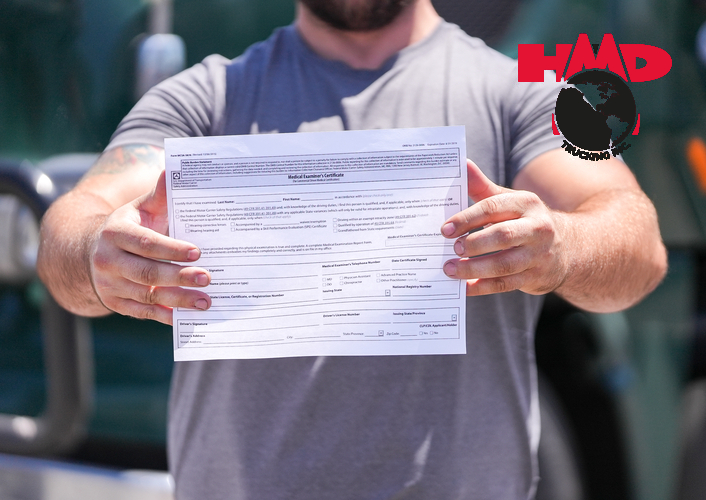
A typical DOT physical covers every medical condition that might affect your performance. But before the examination, you need to provide the following documents:
Detailed Health History Form
When applying for a DOT physical, the following medical records are required:
- The medications you currently take.
- A list of previous surgeries.
- A record of your consumption of alcoholic beverages and any other related substances.
- Your cigarette (tobacco) smoking history.
- Pre-existing medical conditions.
- Current health symptoms.
- Your history of drug tests.
- Previous consumption of (or addiction to) illegal substances.
Physical Examination
The medical examiner will also have to evaluate your physical status and physiological traits. According to FMCSA regulations, the doctor or nurse has to check the following:
- Height
- Weight
- Blood pressure
- Skin
- Eyes
- Ears
- Mouth and throat
- Heart
- Lungs and chest
- Abdomen
- Back and spine
- Genital and urinary system
- Extremities and joints
- Nervous system
- Circulatory system
As part of the nervous system check, the examiner will also evaluate your reflexes to see your reaction speed. You will also need to pass hearing and vision tests (we’ll cover those in detail later).
In addition, the doctor will also check your gait (the way you walk) as well as your general appearance to see if you have any physical conditions that might hamper your performance as a driver.
Urinalysis
You will also need to provide a urine sample for analysis. A urinalysis is a routine check of your kidney and liver function; however, the examiner can also use the sample to test you for drug use.
A Sleep Apnea Test
According to experts from the Mayo Clinic, sleep apnea is a disorder that affects your breathing while sleeping. Since this condition can lead to Type-2 diabetes or hypertension, the FMCSA also mandates it for those seeking CDL certification.
How Long Does a DOT Physical Take?
A DOT test takes around 60-72 minutes, depending on the medical facility. This time frame covers everything, from filling out the history form to the final test. If you have any conditions that require further referrals, the DOT physical exam might take you up to 45 days to complete while your certification remains on a “Pending” status.
What Are the DOT Physical Requirements?
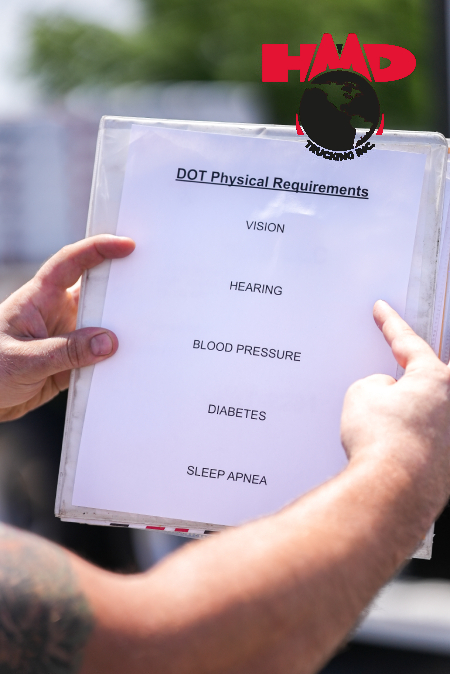
The DOT requirements are strict and thorough, considering the potential cost to lives and property if anything goes unnoticed during the test. You need to provide a bill of health that meets certain minimum DOT physicals requirements.
Vision Requirements
Your ability to see clearly even in poor weather makes a massive difference as a truck driver. If you have impaired vision, you will be unable to react quickly to unforeseen obstacles on the road.
With that in mind, you need to have a vision of at least 20/40 (without glasses or contact lenses) on the standard Snellen Chart. Your field of vision should also cover at least 70 degrees in each eye.
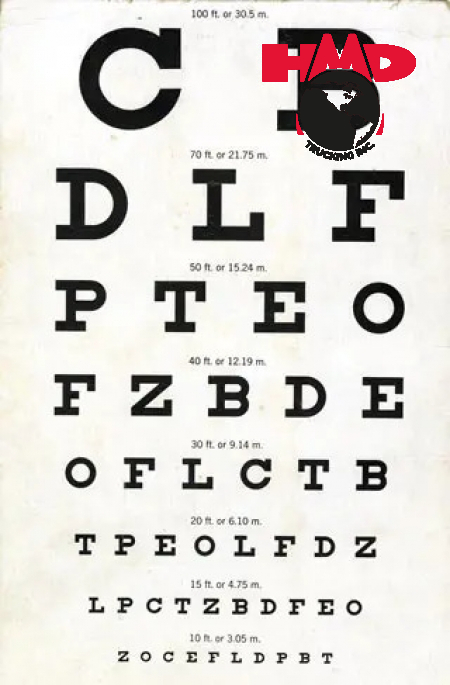
Source: American Academy of Ophthalmology
If you wear glasses or contact lenses, you still stand a chance of meeting the vision requirements, provided you wear them to the examination as well as while driving. Your certificate will also bear a tag saying that you are “qualified only if wearing corrective lenses.”
As of March 2022, truck drivers can get a vision exemption from the FMCSA if they meet the new DOT physical vision requirements.
Hearing Requirements
During your DOT physical, the examiner will also evaluate your auditory faculties with or without your hearing aid. If you cannot distinguish low sounds, like a whisper, within close proximity to the source, then you are not fit to drive.
Fortunately, most audiometry examiners will provide you with a hearing device to fix the problem. Alternatively, you can follow this procedure to apply for the hearing exemption.
Blood Pressure Requirements
According to the Center for Diseases Control (CDC), high blood pressure is one of the leading causes of death in the United States — and 26% of truckers are at the risk of high blood pressure.
The DOT blood pressure requirements for 2024 state that to be certified for as long as two years, your blood pressure should be below 140/90. You can still get the certification at higher readings under certain conditions of your stage. For instance, Stage 1 hypertension-the reading of 140/90 to 159/99-drivers may be awarded a certification for one year. Those with Stage 2 hypertension of 160/100 to 179/109 can be given three-month certification once they are able to lower the BP below 140/90.
You might need to get a clearance letter from your cardiologist or pass the Exercise Tolerance Test to prove your fitness to drive.
Diabetes Requirements
You also need to pass DOT physical diabetes requirements. Although diabetes is one of the disqualifying conditions, you can still pass your physicals if you have the following:
- A letter from your primary care provider (PCP) confirming no history of insulin use, hypoglycemia episodes, or complications.
- The last HgA1C lab results from the past 4 months (3 months for drivers who use insulin).
Sleep Apnea Requirements
All medical examiners must follow strict DOT physical requirements for sleep apnea because any failed diagnosis might lead to fatal accidents.
Sleep apnea comes in three forms:
- Obstructive sleep apnea (OSA) — comes from weakened or blocked airways. Over 7% of the entire population suffers from this condition.
- Central sleep apnea — results from a lack of communication between the brain and the respiratory system.
- Mixed sleep apnea — a combination of the apnea forms mentioned above.
If you have sleep apnea, you can get an exemption if you have the following Continuous Positive Airway Pressure (CPAP) documents:
- A CPAP compliance log showing the machine used at least 70% of the time, with over 4 hours of usage for each night that’s part of the 70% interval (printed within the past 90 days).
- A letter from your treating medical provider stating that you don’t suffer from narcolepsy and that you are safe to operate a commercial vehicle.
Starting from 2023 truck drivers also need to provide their urine samples to have it analyzed for substances like marijuana, cocaine etc., the presence of which in the blood can lead to the driver’s disqualification.
Where Do You Go to Get a DOT Physical?

You can go to any certified medical institution for your DOT physical. Any licensed medical examiners listed in the FMCSA National Registry can also perform the tests. These include:
- Medical doctor (MD),
- Osteopathic doctor (DO),
- Chiropractor (DC),
- Physician Assistant (PA),
- Advanced practice registered nurse (APRN).
What Is the Procedure for a DOT Physical Exam?
First, the medical examiner will go through your health records. If you have any chronic conditions, they will take note of them and run the required tests. The doctor can refer you to specialists for specific hearing and vision tests for further evaluation.
During the physical assessment, the doctor or nurse will take your weight and height, as well as check your reflexes. Eventually, they will calculate your body mass index (BMI) and check your blood sugar levels.
After the exam, you will get your certificate. If the result turns out to be inconclusive, the examiner will recommend further testing.
What Do You Need to Bring to a DOT Physical?
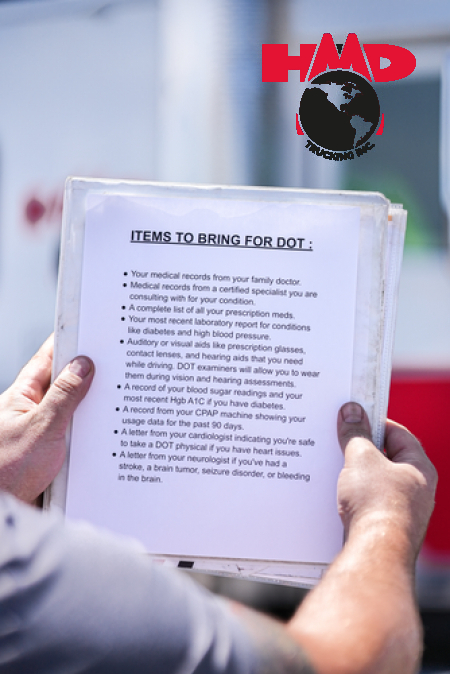
The documents you need for your DOT physical will depend on the examiner. If you are visiting your family doctor, they’ll already have some of your records. But if you are going to a new physician, here are some of the requirements to bring along:
- Your medical records from your family doctor.
- Medical records from a certified specialist you are consulting with for your condition.
- A complete list of all your prescription meds.
- Your most recent laboratory report for conditions like diabetes and high blood pressure.
- Auditory or visual aids like prescription glasses, contact lenses, and hearing aids that you need while driving. DOT examiners will allow you to wear them during vision and hearing assessments.
- A record of your blood sugar readings and your most recent Hgb A1C if you have diabetes.
- A record from your CPAP machine showing your usage data for the past 90 days.
- A letter from your cardiologist indicating you're safe to take a DOT physical if you have heart issues.
- A letter from your neurologist if you've had a stroke, a brain tumor, seizure disorder, or bleeding in the brain.
You will also need to fill out the FMCSA medical examination report form before or after the exam. So consider printing it out before going to the hospital or testing center.
What Can Disqualify You From a DOT Physical?
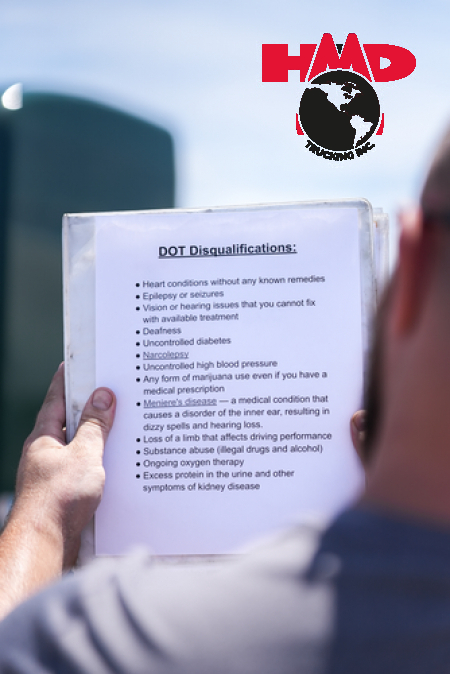
We’ve already mentioned conditions like sleep apnea and how they might automatically disqualify you from being a truck driver. But there are other conditions (health and behavioral) that could disqualify you from passing a DOT physical exam:
- Heart conditions without any known remedies.
- Epilepsy or seizures.
- Vision or hearing issues that you cannot fix with available treatment.
- Deafness.
- Uncontrolled diabetes.
- Narcolepsy.
- Uncontrolled high blood pressure.
- Any form of marijuana use even if you have a medical prescription.
- Meniere's disease — a medical condition that causes a disorder of the inner ear, resulting in dizzy spells and hearing loss.
- Loss of a limb that affects driving performance.
- Substance abuse (illegal drugs and alcohol).
- Ongoing oxygen therapy.
- Excess protein in the urine and other symptoms of kidney disease.
Even though these conditions are the most common causes of DOT physical disqualifications, you still have to check the DOT and FMCSA websites for up-to-date information.
How to Prepare for a Physical Exam?
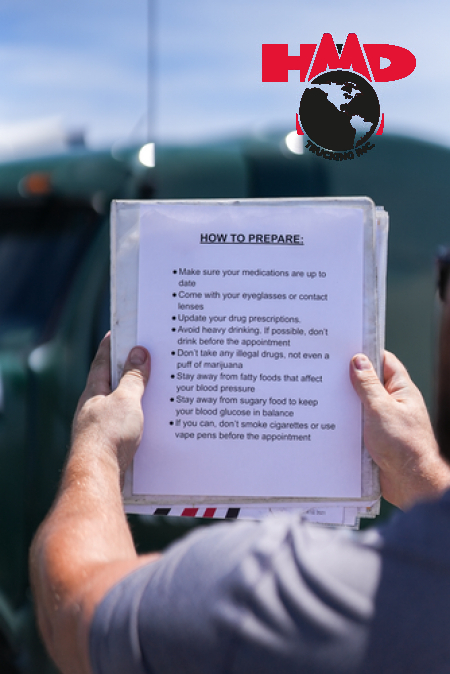
Before going for a physical exam, you need to prepare yourself and get your records in order. Follow these steps to gear up for your DOT physical exam:
- Make sure your medications are up to date.
- Come with your eyeglasses or contact lenses.
- Update your drug prescriptions.
- Avoid heavy drinking. If possible, don’t drink before the appointment.
- Don’t take any illegal drugs, not even a puff of marijuana.
- Stay away from fatty foods that affect your blood pressure.
- Stay away from sugary food to keep your blood glucose in balance.
- If you can, don’t smoke cigarettes or use vape pens before the appointment.
How Much Does the DOT Physical Cost?

The cost for DOT physical ranges between $80 to $150, depending on the medical institution and the examiner. You’ll have to reach out to individual clinics and physicians to find out the actual price.
Unfortunately, your insurance likely does not provide coverage for your DOT test. But on the bright side, most companies cover the cost of DOT physicals for their drivers. Even if you are going for a DOT physical renewal, your employer can help you pay for everything.
What Happens if You Fail the DOT Physical?

Drivers fail DOT physical tests, but that doesn’t mean you have to give up on your dreams of becoming a truck driver.
The FMCSA offers an alternative as a variance — an exemption for drivers with certain manageable medical conditions.
Your variance can entitle you to FMCSA hearing, diabetes, and vision exemptions, which we discussed earlier. Drivers missing a limb can also apply for the Skill Performance Evaluation (SPE) certificate program to show that they can safely operate a truck with their prosthetics.
Check out the nationwide venues for the SPE evaluation.
Conclusion
Going for a DOT physical examination might sound scary at first, but it is a straightforward process if you have a clean health record. Even if you have a medical condition that disqualifies you from driving, you can still apply for exemptions from the FMCSA. Above all, always remember that the DOT physical exam is not a “gotcha” kind of test. Nobody is out to get you. The examiners are just professionals trying to keep you and others on the road safe. You can also check out our hazmat truck driver jobs page which we update regularly.
If you want to work with a company that cares about the driver’s overall health and wellbeing, HMD Trucking is the place for you. Our personalized approach to trucking makes us the favorite destination for drivers (with at least 6 months of CDL A experience). Apply with us now to start your trucking adventure!
If you liked this article, then we recommend that you read our article about how does per diem work for truck drivers.


